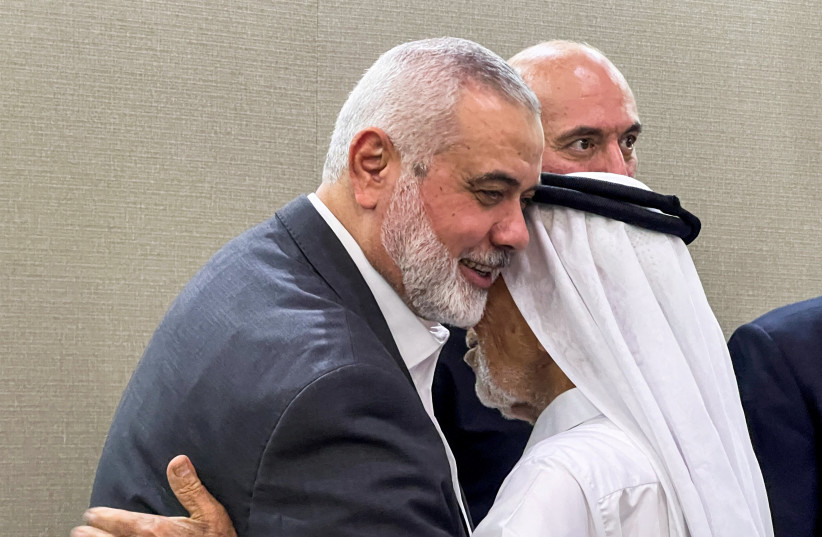Hamas warned that the hostage deal talks held Monday in Cairo by CIA Director William Burns could collapse due to actions by the IDF and Prime Minister Benjamin Netanyahu.
During a call with mediators, Hamas chief Ismail Haniyeh said he held Netanyahu and Israel’s army fully responsible for the potential collapse of negotiations, the group said.
In a message on its Telegram channel, it warned that the IDF's renewed campaign in Gaza City could push mediated ceasefire talks back to square one.
A message posted there earlier in the day accused Netanyahu of “placing additional obstacles in the way of negotiations as he escalates his aggression and crimes against our people.”
Hamas stressed that it had demonstrated “flexibility and positivity to facilitate reaching an agreement to halt the Zionist aggression” in Gaza as it called on mediating countries Qatar and Egypt to stop Netanyahu’s "manipulations and crime.”

Gaps remain on both sides
“We’ve been working this very, very hard, and there are still some gaps that remain in the two sides, in the positions, but we wouldn’t have sent a team over there if we didn’t think that we had a shot here,” he said.
He noted that as part of the US efforts to close the deal, US Special Envoy Brett McGurk was in Cairo along with Burns. The CIA director is expected to hold a larger summit Wednesday in Doha to discuss the three-phased hostage deal US President Joe Biden first unveiled in Washington on May 31.
Kirby said, “on both sides, you see public comments that are not reflective of the conversations we are having privately with them or their interlocutors.”
At home, Netanyahu was slammed by his right-wing coalition partners who threatened to collapse the government if he made the deal, and by the opposition who accused him of sabotaging it for political gain.
At issue for opponents of the three-phase proposal has been the question of whether it would prematurely end the Gaza war before Hamas has been eliminated.
IDF Spokesperson Rear-Admiral Daniel Hagari told ABC that Hamas would still be in Gaza five years from now. It was a statement that underscored the depth of Hamas’s entrenchment in the enclave which it has ruled since it forcibly seized control of the enclave in a coup in 2007.
Finance Minister Bezalel Smotrich, who heads the Religious Zionist Party, and National Security Minister Itamar Ben-Gvir, who leads the Otzma Yehudit Party both threatened to quit the government should Netanyahu agree to the deal.
During a press conference in the Knesset, Smotrich warned that the Hamas leader in Gaza Yahya Sinwar would view the deal as a victory. He held up a photograph of Sinwar holding up the fingers of both his hands in a “V for Victory.”
“This is the picture we will get in Gaza if, God forbid, we sign this” deal, Smotrich said, adding that the agreement was a “defeat and humiliation for Israel and a victory for Sinwar.”
Smotrich cast doubt on Hamas’s ability to fulfill the terms of the deal, warning that it essentially consigned to death those hostages who would not be released in the first phase of the deal.
“It will cause thousands of people to be murdered in the next massacre by Sinwar and Hamas,” Smotrich said, in a reference to the 1,200 people killed during the Hamas-led attack on October 7.
Smotrich accused Netanyahu of not holding to his promise of complete victory over Hamas.
“Mr. Prime Minister, this is not an absolute victory. This is a complete failure,” Smotrich said, stressing, “We will not be part of a deal to surrender to Hamas.”
Netanyahu has repeatedly insisted that he has no plans to end the war until all its goals are achieved, which are the release of all the hostages and the elimination of Hamas.
He has also stressed in the last weeks that Israel is committed to the Biden proposal and that the goals of the war can be achieved within the scope of that May 31 deal.
Hamas had initially rejected the deal, holding fast to its long-term demand that Israel must agree to a permanent ceasefire and a complete IDF withdrawal from the enclave before it would release any hostages.
Last week, Hamas dropped that demand, but has since attempted to make amendments to the deal that would achieve a de-facto permanent ceasefire.
Israel has held fast to its stance that it is committed to the May 31 Biden proposal and that all details that would be negotiated had to fall within the framework of that deal.
Netanyahu reiterated Israel’s red lines Sunday in a public statement, explaining that alongside a commitment to the Biden deal and the war goals, there were three other factors at play.
There would be no weapon smuggling into Gaza from Egypt, terrorists could not return to north Gaza and Israel would maximize the number of live hostages that would be freed from the enclave.
Defense Minister Yoav Gallant met with representatives of families of the hostage on Monday, assuring them that Israel would do everything possible to maximize the renewed opportunity for a deal.
Gallant said it was the IDF’s military campaign in Gaza that created a new opening in the talks.
“The military pressure created the conditions that make it possible to move forward with the deal,” Gallant said. “We must take advantage of the military pressure to move the deal and not miss it.”
Reuters contributed to this report.
